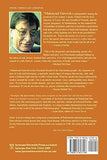The Adam of Two Edens: Poems
A collection of poems by Palestinian poet Mahmoud Darwish. The poems range from dreamy reflections to bitter longings for the Palestine that was lost when Israel was created in 1948. Mahmoud Darwish has published more than thirty books of poetry and prose. He is the recipient of many international literary awrds and his work has been translated into more than twenty-two languages.
A revered Palestinian poet recipient of France's Knight of Arts and Belles Lettres medal and the Lotus Prize, and author of 20 poetry collections among other works Darwish was six at the time of the Israeli occupations of 1948; his father was killed and his family fled to Lebanon. As a young man, he was repeatedly imprisoned for reading his poetry and not carrying the proper papers. He has since lived all over the world, and advised the PLO Executive Committee between 1982 and 1993, when he resigned in protest of the Oslo accords. In these 14 long and serial poems, translated by various hands and put into their final English versions here by Daniel Abdalhayy Moore, variegated repetitions evince the panorama and detail of refugee experience: "a desert for eternal absurdity/ a desert for the tablets of the law/ ...for school books, prophets and scientists." The voice throughout accumulates a rich mix of world-weariness and endurance: "Ruba'iyat" repeats the refrain "I've seen all I want to see of..." with different referents ("of the sea," "of blood," "of lightning"), while in "Eleven Planets," the speaker finds his own identity foreign: "fearing... my fountain's water,/ milk on the lips of figs, fearing my own language." (Apr.)Forecast: Darwish's work was at the center of an Israeli curriculum controversy last year, reported in the New York Times and elsewhere. When it was announced that Darwish's work would be compulsory for Israeli high school students, everyone from Jewish hard-liners to then Prime Minister Ehud Barak weighed in. American readers, with these fine translations now available, can decide for themselves. Expect serious sales on campus.
[Darwish’s] lyrical writings have long been a touchstone of Palestinian national passions… [he] has written poems that range from dreamy reflections and love to bitter longing for the Palestine that was lost when Israel was created in 1948. He writes of pain and exile. ― The New York Times
Darwish is the Essential Breath of the Palestine people, the eloquent witness of exile and belonging… What he speaks has been embraced by readers around the world—his is an utterly necessary voice, unforgettable once discovered. If you know his words already, you need to know this comprehensive new translation. If you do not know him yet, please celebrate this crucial meeting. ― Naomi Shahib Nye, author of The Space Between our Footsteps: Poems and Paintings from the Middle East
Mahmoud Darwish is indisputably among the greatest of our century’s poets. Gifted with the lyric intensity of Lorca, the epic breadth of Neruda, and the elegiac poignancy of Mandelstam, he has endured the vicissitudes of politics and fate to perform a meticulous and spiritual excavation of land and language, diaspora and exile, while lighting new fires in the possibilities for poetic art. ― Carol Forché









